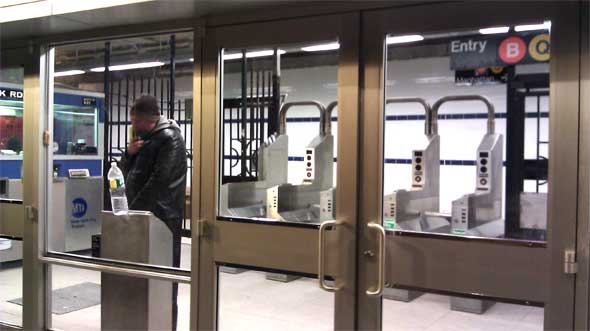Golden Proposes Transit Funding Lockbox Act

THE COMMUTE: In recent years Albany has been stealing increasing amounts of dedicated transit funding to help balance its ever-increasing budget deficit. In 2010, Albany redirected $143 million in MTA money to the general fund. This reduction in transit funding was the primary impetus for last year’s severe service cutbacks. This year, Governor Cuomo removed an additional $200 million in operating funds from the MTA’s operating budget, shifting $100 to its capital budget which has a $10 billion gap.
This problem is not unique to New York State. In California voters recent passed Proposition 22 to protect transit funds.
To assure this does not continue every time Albany is short of cash, necessitating additional service cuts and fare increases, State Senator Martin Golden and Assemblyman James Brennan proposed a new law last week called the Transit Funding Lockbox Act.
Unfortunately, some of the same lawmakers who have voted to raid transit funds have also spoken out the loudest against the service cuts. We have not been able to determine how Golden and Brennan voted on last year’s budget, but they are at least now trying to do something about this situation.
According to Golden’s Press release:
“The transit system needs every dollar of dedicated tax revenue to pay for mass transit, not diverted to provide budget relief for the State’s deficits,” added Assembly Member Brennan (D-Park Slope). “Further sweeps by the State for the MTA’s dedicated funds will be a disaster for mass transit, and this legislation will provide needed protection.”
So far so good, but two parts of his press release cause me concern.
(1) “The capital program pays for system maintenance and improvement and the funding gap will require at least $1 billion in new recurring revenues.”
As far as I know, it is the operating budget that pays for system maintenance, not the capital program. I would hope that a state senator would know more about this than myself. Golden may be referring to Station Rehabilitation Projects (which are capital projects) as system maintenance.
The press release continues: (The part I bolded is a bigger concern)
(2) “The Transit Funding Lockbox Act (A6766/S4257) would amend section 182 of the State Executive Law to prohibit the State Budget Director from diverting revenues – derived from taxes and fees paid by the public expressly to fund the Metropolitan Transportation Authority – into the general fund of the state or into any other fund maintained for the support of another governmental purpose. Such a diversion can only be done by statute enacted into law. Any statutory diversion of funds shall include a diversion impact statement detailing the diversion, including amount and an estimate of the impact of the diversion on the level of mass transit service, maintenance and security.
My question: Are lawmakers building in a loophole that would still allow funds to be diverted, albeit through a more difficult process? If so, why? If my utility bill says I am paying $1.48 as an MTA surcharge, should I not be assured that this money is indeed going to the MTA? Part of the reason the MTA was created in the first place was to provide a steady revenue stream for the capital budget by permitting a diversion of bridge and tunnel tolls from road maintenance to the subways.
Triborough Bridge and Tunnel tolls for the major crossings which had remained at 25 cents (35 cents for the Battery Tunnel) from 1936 to 1972, rose rapidly once excess revenues were diverted to mass transit and are now $6.50 for a one-way toll and have been rising each year. Tolls cannot keep rising without any assurances that this money will fund mass transit in their entirety. That is why this legislation is so important.
We can only hope it becomes law, and Albany ends their practice of using transit money for other purposes. We cannot afford any more service cuts, or reductions in maintenance. It seems that the paint is peeling in every subway station, even the ones that were recently rehabbed with brand new tiles and lighting. That is a disgrace. We have seen the 1980s and do not want to go there again. Hopefully Albany agrees.
It should be noted, however that more money will not solve all the MTA’s problems. It must not give them an excuse not to continue to strive to become more efficient. Abuses, some of them resulting from arcane work rules, must also be curbed and priorities reset. More attention needs to be paid to find ways for all bus routes to operate better, with more of a focus on serving the passenger even if it involves spending additional funds that the MTA thus far has not been willing to do. The lockbox is only a first step, albeit an important one, to getting the MTA back on track toward its correct mission, that of regionalizing and integrating mass transit, a mission it has never really accomplished.
The Commute is a weekly feature highlighting news and information about the city’s mass transit system and transportation infrastructure. It is written by Allan Rosen, a Manhattan Beach resident and former Director of MTA/NYC Transit Bus Planning (1981).




